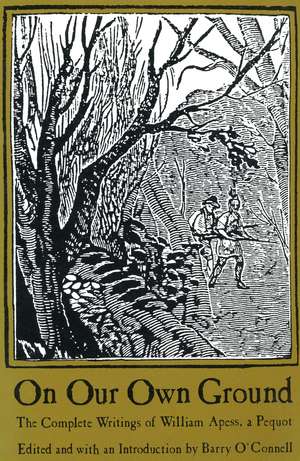On Our Own Ground: The Complete Writings of William Apess, a Pequot: Native Americans of the Northeast
Autor William Apess Editat de Barry O'Connellen Limba Engleză Paperback – 26 feb 1992
William Apess was the first Native American's to fully, and publicly, speak out regarding the racism and unfair treatment that he and others endured. The author's writing is eloquently delivered, instilling the reader with a realistic framework of a political, historical, and personal mindset.
Preț: 227.42 lei
Nou
Puncte Express: 341
Preț estimativ în valută:
43.52€ • 45.56$ • 36.01£
43.52€ • 45.56$ • 36.01£
Carte indisponibilă temporar
Doresc să fiu notificat când acest titlu va fi disponibil:
Se trimite...
Preluare comenzi: 021 569.72.76
Specificații
ISBN-13: 9780870237706
ISBN-10: 0870237705
Pagini: 432
Dimensiuni: 152 x 235 x 28 mm
Greutate: 0.59 kg
Ediția:First Edition
Editura: University of Massachusetts Press
Colecția University of Massachusetts Press
Seria Native Americans of the Northeast
ISBN-10: 0870237705
Pagini: 432
Dimensiuni: 152 x 235 x 28 mm
Greutate: 0.59 kg
Ediția:First Edition
Editura: University of Massachusetts Press
Colecția University of Massachusetts Press
Seria Native Americans of the Northeast
Notă biografică
Editor Barry O'Connell is professor of English at Amherst College.
Recenzii
"Makes available in a superb scholarly edition not only the first published autobiography by a Native American (1829 originally), but also a range of historical, political, and personal writings. The anger in Apess's work, . . . always eloquent, serves a depth of analysis and a layered irony that make pressing claims on any catalog of what is finest and most significant in American literary history."—New York Times Book Review
"The appearance of this volume brings to center stage a writer of great importance and power, the first Native American to speak fully in his own words about the appalling racism of the early republic. . . . With the publication of this work, those who care about what passes for nineteenth-century American literature can never be the same."—New England Quarterly
"A milestone in the evolution of American literary and historical scholarship. By bringing Apess's voice before the public, Barry O'Connell has both broadened our understanding of the literary canon and extended our definition of Native American history. . . . This book should be a part of any library of American letters."—Frederick E. Hoxie, Director, D'Arcy McNickle Center for the History of the American Indian, Newberry Library
"O'Connell's introduction is exemplary in the solidity of its research and the sophistication of its readings. This volume renders a real service to students in a variety of disciplines."—Arnold Krupat, Sarah Lawerence College
"In addition to rescuing Apess from obscurity, the book adds substantially to our understanding of New England Indian history in the post-colonial period. . . . O'Connell's introduction is a first-rate piece of work that will be widely recognized above and beyond the edited collection for a long time to come."—Neal Salisbury, Smith College
"The appearance of this volume brings to center stage a writer of great importance and power, the first Native American to speak fully in his own words about the appalling racism of the early republic. . . . With the publication of this work, those who care about what passes for nineteenth-century American literature can never be the same."—New England Quarterly
"A milestone in the evolution of American literary and historical scholarship. By bringing Apess's voice before the public, Barry O'Connell has both broadened our understanding of the literary canon and extended our definition of Native American history. . . . This book should be a part of any library of American letters."—Frederick E. Hoxie, Director, D'Arcy McNickle Center for the History of the American Indian, Newberry Library
"O'Connell's introduction is exemplary in the solidity of its research and the sophistication of its readings. This volume renders a real service to students in a variety of disciplines."—Arnold Krupat, Sarah Lawerence College
"In addition to rescuing Apess from obscurity, the book adds substantially to our understanding of New England Indian history in the post-colonial period. . . . O'Connell's introduction is a first-rate piece of work that will be widely recognized above and beyond the edited collection for a long time to come."—Neal Salisbury, Smith College














